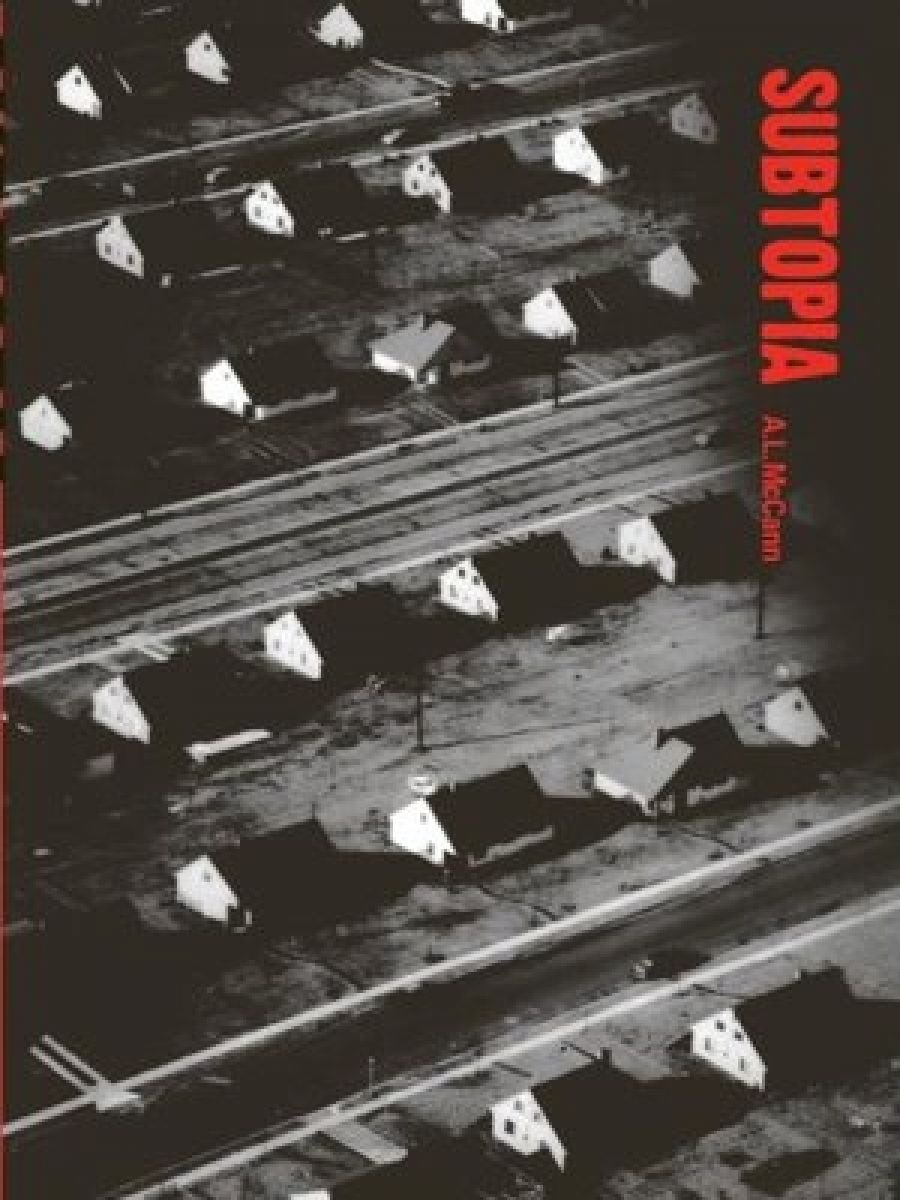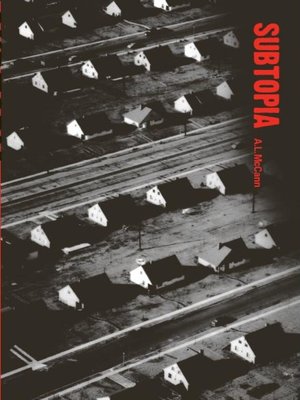
- Free Article: No
- Contents Category: Fiction
- Review Article: Yes
- Article Title: Corpseworld
- Online Only: No
- Custom Highlight Text:
I’ve had disturbing encounters with literature and film before: Reinaldo Arenas’s The Color of Summer (2000) and Stanley Kubrick’s A Clockwork Orange (1971). Their unsettling nature lies in the ways in which they link sex and violence, and show their hooks in the political body and the (masculine) soul. Against oppressive régimes (whether socialist or capitalist), these texts engage in ambiguous defences of instincts that aren’t much prettier than the systems against which their anti-heroes rail.
- Book 1 Title: Subtopia
- Book 1 Biblio: Vulgar Press, $29.95pb, 280pp, 0958079560
- Book 1 Cover Small (400 x 600):

- Book 1 Cover (800 x 1200):

Julian Farrell, McCann’s narrator, is a pathetic would-be revolutionary, a liar and a hypochondriac. We’re introduced to him as an adolescent at a backyard barbeque, where he watches his uncle, the Silver Fox, feel up his sister poolside. His powerlessness is linked to the inequitable relationship between his wealthy uncle and his father, who works for the Silver Fox’s construction company. Later, Julian looks at some of his uncle’s pornography, aroused by pictures of ‘a big, black guy holding two squatting girls on leashes. They were barking like dogs.’ Later still, Ulrike Meinhof, the German left-wing terrorist who was allegedly raped and murdered in jail, becomes Julian’s pin-up girl.
The narrator says of himself: ‘I saw everything and said nothing, hoping myself to slip by unnoticed.’ Julian isn’t percipient or remarkable. The point of interest in his life and, ostensibly, in the book is Martin Bernhard, who embodies a masculinist romance of social rebellion. Julian and Martin first meet as witnesses to a car accident – the victim a woman. They bond over Marlboro Reds and World War II. Martin, as ugly as Johnny Rotten, lives in a grubby home with a harassed mother and an ailing grandfather. Visiting his home, Julian is tricked into drinking some of the dying grandfather’s urine sample. He’s also given a dose of Martin’s anger towards the capitalist West.
When Julian enters university, Martin – social misfit, drug dealer and drunk – becomes known as ‘the Mongrel’. He is ‘an abandoned creature precariously perched on the border between the human and the animal’. Julian finds him repulsive and embarrassing, but also enigmatically serious and self-destructive. He speaks to Julian’s sense of political injustice, inspiring him to see the suburban world of sport and sex around him as ‘an organised culture of distraction’. When Martin drifts off with his girlfriend to Berlin, where the Wall is about to fall, Julian follows.
There is no political glory to be found here. Julian finds Martin mired in domesticity (he has become a father) and trouble: he continues to deal and use drugs. Julian meets the radical Ingrid and becomes drunk on a cocktail of violence and sex confused with hallucinatory politics, which proves too much. He flees, seeking refuge with his reliable girlfriend in the US, land of the obese and grotesque.
Sally, a postgraduate student of literature, provides the novel with uninspired opportunities for academia-bagging (a national sport in Howard’s anti-intellectual Australia). However, the novel saves a particular loathing for the Australian middle-class. Poor old Moorabbin, Julian’s hometown, is a ‘corpseworld’. Martin, who appears only intermittently in Julian’s life, is like a listless spirit from a subterraneous realm of the homeless, the drug addicted, prostitutes and rodents. He is, though, more ‘real’ than any ‘cretinous’ suburbanite. Julian’s vision of penetrating Martin’s world is disturbingly sexualised: ‘I imagined a pale, remote girl, a demure veneer of middle-class piety, expertly arranged for the benefit of parents and teachers, concealing a furtive world of fucking, fingering and sucking, one orifice after another, acrobatic virtuosity, a violent, interminable hunger bordering on a sickness.’
In a metafictional moment, the narrator warns the reader that those ‘moments at which you recognize something in yourself – something latent, something others have accused you of, or something that helps you to punctuate the narrative of your life’ are ‘contrived’. Australian literature is another target of McCann’s novel. Literary studies is presented as bourgeois indoctrination. However, while the narrator attempts to disillusion the reader about the truth powers of narrative, Julian discovers a book by an imaginary Australian author that offers a traditional aesthetic epiphany about capitalist suburbia: ‘The corpseworld … Affluence, leisure, lifestyle, all in the grip of death, all struggling to keep clear of the vast, anonymous gravesite waiting to swallow up everything and everyone.’ Surely it’s a vision McCann himself is trying to impart.
McCann’s bad faith is another hard thing to swallow about this novel: its hatred for Australia (where he was born), the US (where he now works), literature (he writes it) and academics (he is one). In Overland last year, McCann lamented literature’s ‘fall into the marketplace’ and its reactionary aestheticism. Similar sentiments are expressed in the ample publicity material accompanying the book, which is clearly offered in a spirit of serious socialist and literary rebellion. However, while McCann has chosen an independent publisher for Subtopia, he’s escaped neither the marketplace, which remains necessary for this commodity’s existence, nor art, which remains a significant force of persuasion.


Comments powered by CComment